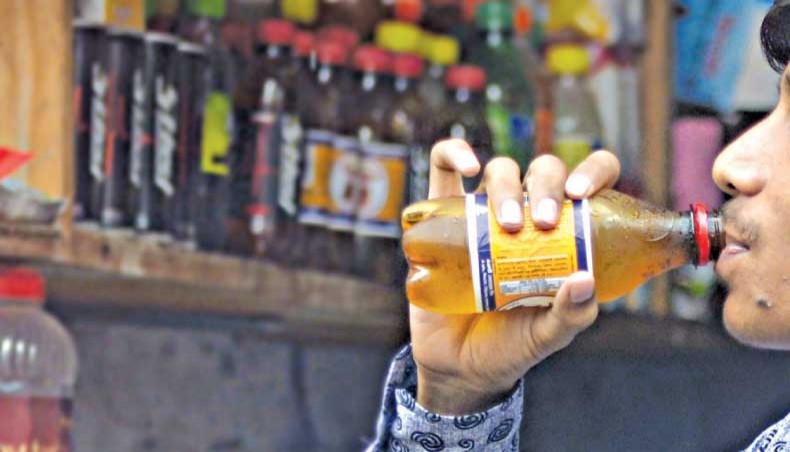Soft drinks pose risks to public health
The country’s mostly unregulated market of soft drinks poses serious risks to public health.
Companies need no certification from the Bangladesh Standards and Testing Institution to start the business of soft drinks except for the carbonated beverages.
Companies producing flavored drinks, juices, and fruit juices usually obtain quality certificates, long after their products became established brands in the market.
And the quality certificates are given without getting the beverages tested to find out the ingredients used in them for coloring, flavoring and sweetening as the agencies concerned lack testing facilities.
Until now, only two juice brands, 14 fruit juice brands and 22 carbonated beverage brands obtained quality certificates from BSTI.
According to BSTI standards, juices are drinks containing cent per cent fruit pulp while fruit juice should contains around 10 per cent fruit pulp. And flavored drink contains only flavors but no pulp.
The BSTI never standardized energy drinks and officially it even does not admit that these drinks are sold everywhere in Bangladesh.
Dozens of uncertified energy drinks, juices, fruit juices and flavoured drinks
are sold in the country with none to check the ingredients in these beverages.
Two rare tests done by Bangladesh Council of Scientific and Industrial Research and the Department of Narcotics Control detected harmful ingredients in 10 fruit juice brands and 57 energy drinks but only four of the brands were taken to court.
Three major soft drink companies contacted by New Age declined to say anything about their control quality issues or even the number of product brands they market.
Studies done abroad linked soft drinks with various health hazards including obesity, diabetes, brain damage, cancer as well liver, and kidney malfunctions.
Absence of any regulations created a dangerous situation with regard to these drinks in Bangladesh, said Dhaka University professor of nutrition and food science Nizamul Hoque Bhuiyan.
Synthetic ingredients beyond permissible limits or in wrong combinations in soft drinks, he said, could be dangerous for health.
Following studies many countries set the permissible standards for the ingredients to be used in beverages.
European and the other western countries even set daily intake limits, depending on ingredients in soft drinks and consumers’ health conditions.
No such standards had ever been set in Bangladesh.
The worst part of it is that the consumers in Bangladesh are not provided with correct information about the ingredients or their quantities in soft drink labels.
The BSTI product certification wing director Ishaque Ali said that as no national standards had been set they cannot monitor the market.
In 2015, following laboratory tests, the BCSIR found the presence of sodium benzoate in them as preservatives at levels between twice and 10 times more than permitted.
During the tests, BCSIR also found that fruit juices sold in cans contained high concentration of heavy metal aluminum residues.
BCSIR principal scientific officer Barun Kanti Saha told New Age that sodium benzoate is used in drinks to increase its shelf life by inhibiting the growth of bacteria, mold and yeast.
As sodium benzoate requires acidic condition to do its job, ascorbic acid is used which might result in release of benzene, which being carcinogen could cause cancer, said AM Zakir Hussain, former director of Institute of Epidemiology, Disease Control and Research.
In 2013, the Department of Narcotics Control officials were shocked to find that the presence of caffeine was in excess of the permissible limits in all the 57 energy drinks tested.
The minimum presence of caffeine in the tested brands was 200mg per liter though the permissible limit is 130mg per liter.
The tests revealed 325 mg of caffeine per liter in an imported energy drink, the highest.
The tests revealed the presence of alcohol in excess of the permissible level in some of the energy drink while some others contained sildenafil citrate, an ingredient used in Viagra.
It’s difficult to believe that these addictive beverages are sold in this country without any checks for which even children, pregnant women and elderly people consume them not knowing what they were drinking, DNC chief chemical examiner Dulal Krishna Saha told New Age.
Regular and excessive caffeine intake might cause cardiovascular diseases, said Dhaka Medical College’s associate professor of medicine Robed Amin
This could, he said, also damage brain.
Other negative health impacts of soft drinks arise from the high concentration sugar in them, he said.
High sugar intake, he said, elevates insulin levels besides causing obesity, bloating, fatigue, arthritis, migraines, lower the immune system, gallstones and breast cancer.
To discourage soft drink sales slapping sugar tax on soft drink producers is underway in the UK.
Much remains to be done to ensure that people would only be able to drink safe soft drinks, said Bangladesh Food Safety Authority member Mahbub Kabir.
News Courtesy: www.newagebd.net











